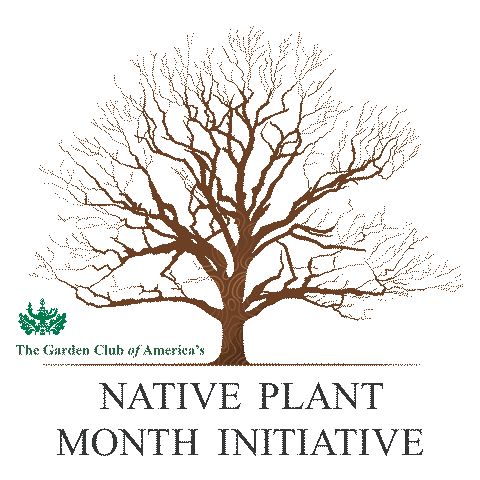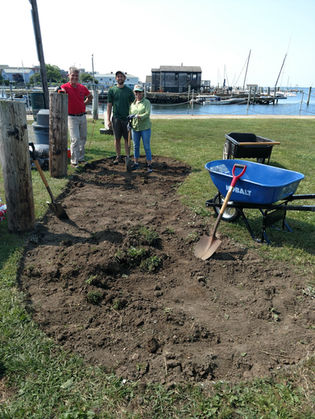
In 2022, the Garden Club of America launched the National Native Plant Month Initiative. "Native Plant Month" was declared in 2023 by Ned Lamont and other governors across America to promote using plants that naturally evolved in a particular region, ecosystem, or habitat without human introduction. This state-wide declaration is an important step in creating public awareness in the Stonington Borough of the critical role native plants play in supporting a healthy environment, thriving wildlife and pollinator populations, and reducing the use of pesticides and fertilizers.

Stonington Garden Club's Role
The Stonington Garden Club (SGC) is pleased to announce that it has been awarded a Partners for Plants (P4P) grant from The Garden Club of America. The Garden Club of America awards grants annually through their P4P program to facilitate hands-on projects between garden clubs and managers on federal, state, local, and other significant public lands. As a first-time recipient, the Stonington Garden Club has been awarded the maximum 1st-year grant of $3,000 to renourish, redesign, and replant the public gardens at the Stonington Borough Post Office and the Wayland’s Wharf Rain Garden.
The club created the Borough Post Office garden from the proceeds of their first garden tour in 1961 and has cared for the garden ever since. As part of the club’s Native Plant Project, the garden will be redesigned and replanted with native plants that absorb toxins and harmful carbon emissions, and feed pollinating birds and bees to support our human food sources. In addition, the grant will be used to expand the Wayland’s Wharf Rain Garden to maximize its capacity to capture contaminated stormwater runoff from the parking area using native plants as filters before the water flows into Stonington Harbor.

Video Presention
Borough Post Office Garden
The Stonington Borough Post Office is a prominent landmark near the Village entrance. The federal land in front of Stonington Borough’s post office is the “gateway” to residents and visitors to this historic seaside town. Since 1964, our members have cared for these two small gardens, pulling out invasives, planting, weeding, watering, and mulching this space to enhance the beauty of the Borough. The gardens must be amended, redesigned, and replanted with attractive native plants that resist the negative elements of climate change.
Progress
The gardening club is currently assessing the quality of the soil, environmental challenges, and other factors that may affect the growth of plants. To ensure they get the best possible results, they have sought the advice of experts from Connecticut and Rhode Island, including the resources from the Connecticut Agricultural Experiment Station and UConn's Connecticut Sea Grant College program. The club has also enlisted the support of Maggie Redfern, the Executive Director of Connecticut College Arboretum. Additionally, Vilma Gregoropoulos, a professional landscaper, has been hired to provide guidance on garden design and plant selection.
Wayland's Wharf Rain Garden
In 2018, the Stonington Garden Club partnered with Stonington Borough, the Long Island Sound Study Group, and the Eastern Connecticut Conservation District (ECCD) to create a rain garden at Wayland's Wharf. The garden's purpose was to filter toxins from the stormwater runoff in the parking area before it flowed into Stonington Harbor. While the garden is currently doing its job, it is too small to serve the entire area. The native plants in the garden filter toxins from the water collected in its bowl-shaped base, but gallons of toxin-infused stormwater still flow directly from the parking area into the harbor during and after rain and wind storms. To expand the garden's positive impact on this coastal location, there is a proposal to increase its size.
Winter Seed Sowing
Winter sowing is an ideal way to germinate native plants. Native seeds are acclimated to the local climate and sprout as days get longer and the weather warms up. For the last couple of years, The Stonington Garden Club held Winter Sowing Workshops, which are planted in the gardens we care for in the spring. Our club has found project support from the local Wild Ones, Inc. chapter, which donated native plant seeds for our winter sowing project. Barbara Duncan, President of the North Stonington Garden Club, has also helped guide the project.
Educational Initiatives
The links below focus on SGC’s work to educate members of the club and the greater community about the important benefits of planting native plants in Stonington. Our town is located in southeastern Connecticut, bordering Long Island Sound. Clean water and air are essential for support of the town’s harbor and other living habitats along the Connecticut shoreline. The ideas shared are only a few of the many activities promoting native plants to our members and community.
They were selected to hopefully inspire others to share their knowledge about the benefits of native plants.
Activities Presented:































